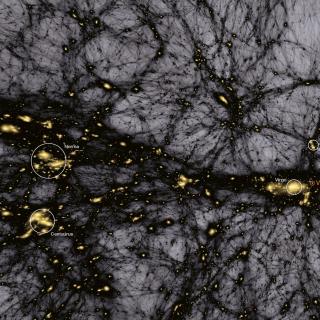Bibcode
Balaguera-Antolínez, A.; Kitaura, Francisco-Shu; Pellejero-Ibáñez, M-; Zhao, Cheng; Abel, Tom
Bibliographical reference
Monthly Notices of the Royal Astronomical Society: Letters, Volume 483, Issue 1, p.L58-L63
Advertised on:
2
2019
Citations
37
Refereed citations
36
Description
We present BAM: a novel Bias Assignment Method envisaged to generate
mock catalogues. Combining the statistics of dark matter tracers from a
high-resolution cosmological N-body simulation and the dark matter
density field calculated from down-sampled initial conditions using
efficient structure formation solvers, we extract the halo-bias relation
on a mesh of a 3 h^{-1} Mpc cell side resolution as a function of
properties of the dark matter density field (e.g. local density, cosmic
web type), automatically including stochastic, deterministic, local and
non-local components. We use this information to sample the halo density
field, accounting for ignored dependencies through an iterative process.
By construction, our approach reaches {˜ } 1 {per cent} accuracy
in the majority of the k-range up to the Nyquist frequency without
systematic deviations for power spectra (about k ˜ 1 h
Mpc-1) using either particle mesh or Lagrangian perturbation
theory based solvers. When using phase-space mapping to compensate the
low resolution of the approximate gravity solvers, our method reproduces
the bispectra of the reference within 10 {per cent} precision studying
configurations tracing the quasi-non-linear regime. BAM has the
potential to become a standard technique to produce mock halo and galaxy
catalogues for future galaxy surveys and cosmological studies being
highly accurate, efficient and parameter free.
Related projects

Cosmology with Large Scale Structure Probes
The Cosmic Microwave Background (CMB) contains the statistical information about the early seeds of the structure formation in our Universe. Its natural counterpart in the local universe is the distribution of galaxies that arises as a result of gravitational growth of those primordial and small density fluctuations. The characterization of the
FRANCISCO SHU
KITAURA JOYANES